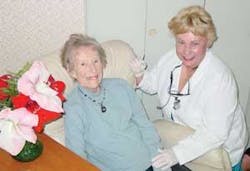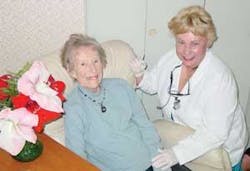What is a hero?
The definition of hero is “a doer of great or brave deeds.” Heroism is courage, gallantry, and fortitude. Make no mistake about it. Dental hygiene has its heroes, and Judy Boothby is one of them.
Most of us have people in our minds and hearts who are special to us, and these people often become our “heroes.” It can be a famous sports figure, a dedicated military person, or some personal friend who did something great, something that touched you.
Every profession has its heroes too, and dental hygiene is no exception. Dental hygiene heroes and heroines are those brave individuals who have fought, sacrificed, challenged the powers that be, and persevered, even in the face of great odds and possible serious consequences to further the profession of dental hygiene.
Judy Boothby is a dental hygiene heroine whose story deserves to be told again and again. Some of you have at least heard of Judy, and a few know the details of what she had to go through to get where she is today. Many of you are just like I was before I started “digging” for information - you had not heard of her until now.
The way I found Judy is odd. While conducting an Internet search for information related to dental hygiene and malpractice, her name popped up. I learned the California Dental Association (CDA) had sued her (and 20 other hygienists) several years ago to stop them from practicing in alternative settings.
In 1987, the California legislature (through the Office of Statewide Health, Planning, and Development) and the governor approved a pilot program in which Boothby and 17 other hygienists were given the authority to work independently of dentists. The state would use this experiment to decide whether to expand the option to all hygienists. The data was collected to prove the safety, cost effectiveness, and access to care to the underserved residents of California.
While other hygienists in California still could work only in dentists’ offices, the small group taking part in the project could travel throughout their communities, often to nursing homes and other facilities where people might have trouble getting to a dentist’s office. A few years after the project was started, the CDA applied a stipulation that each patient would need to have a prescription of sorts, in the form of written approval from a dentist or doctor to see a hygienist outside a dental office. While this stipulation did not originally exist, it presently stands as a frustrating barrier to care for some patients when a doctor or dentist is not available.
The California Dental Association argued that this arrangement could lead to hygienists diagnosing patients - a job for which hygienists are not trained - and the organization sued to block the pilot project. The suit succeeded, but the main issue in the courtroom had to do with government procedure, not dental care.
The CDA claimed - and an appeals court eventually agreed - that because a public notice about the pilot project had not been distributed properly, the project was illegal and should be halted.
The state responded by quickly creating another pilot project, this time being more careful to implement it properly. Three more hygienists were brought in, for a total of 21 statewide who were allowed to go mobile. The hygienists in the pilot study treated over 15,000 patients very successfully, and there was not one complaint toward any of the 21 registered dental hygienists.
Boothby, with license No. 1 from the state, bought $5,000 worth of mobile equipment and a van, and started her business.
Although she had plenty of experience - having worked in dental offices as a hygienist since 1969 - many dentists opposed her foray into independence.
“I was kicked out of a lot of places because the dentists [contracted by nursing homes] said, ‘Don’t allow that woman in there,’ ” Boothby said. But she was persistent, motivated by an important experience in her life.
“My father died of a brain tumor, and I noticed that he had no dental care in the nursing home he was in,” she said. “And I thought, why isn’t there a better continuity of care in these facilities for dental care? So that planted the seed for me to someday be instrumental in developing an avenue of better dental care for residents of a skilled nursing facility.”
Based on the success of Boothby and the other hygienists in the pilot project, the state passed a law in 1997 allowing all hygienists to apply for a state license to operate independently. The law requires 150 hours of special training, and limits their practice to nursing homes, the residences of the homebound, and areas declared to be underserved by dental professionals.
Judy’s business, Dental Hygiene Out & About, was established in 1987. She employs a chairside dental assistant - her daughter, Heather Boothby, who has a degree in gerontology just like her mother - and an office manager. They use portable equipment to bring Dental Hygiene Out & About directly to health facilities. This allows the patient to remain in his or her familiar environment while maintaining dental health with dignity and respect.
She treats Medi-Cal patients, people with private insurance, and some who pay in cash. The cost varies depending on the services provided, but is about the same as a person would pay for the same services at a dentist’s office. About two-thirds of Boothby’s patients are seniors, and most of the rest are disabled people whose physical or mental ailments make traveling to a dentist’s office difficult or impossible.
Judy Boothby is no ordinary hygienist. In addition to her standard dental hygiene education from Cabrillo College, she also has a bachelor’s degree in gerontology from California State University, Sacramento. Her clinical training was affiliated with the University of the Pacific School of Dentistry, San Francisco. Judy has also completed specialized graduate dental hygiene education in the treatment of the elderly and those with special needs from the University of Washington School of Dentistry.
In 1989, Judy received the Warner-Lambert/American Dental Hygiene Association Award. This prestigious national award was designated for developing and implementing innovations in dental hygiene service delivery. Judy’s longstanding ADHA membership is further evidence of her support for the profession.
In addition to her business, Judy is on the staff at West Los Angeles College and the University of the Pacific School of Dentistry as an instructor for licensing hygienists in the new category of Registered Dental Hygienist in Alternative Practice. Presently, Judy is setting up a mentorship program for new graduates of the RDHAP program to acquire a “hands-on” experience of developing an RDHAP practice. She has written “Guide to Getting Started,” a book for RDHAPs in private practice.
The need is great!
Currently in California there are 120 licensed RDHAPs. There are three segments of the population that receive little or no dental care - the elderly, the disabled, and the indigent. To compound this problem, many areas of the country are facing a growing shortage of dentists. Indeed, some dentists are so busy taking care of the patients who come to their practices that they do not have the time or inclination to address the dental needs of those who cannot come to their offices.
People like Judy Boothby are willing and able to help with that need. The driving force behind Judy’s perseverance was not so much that she wanted to own her own business, but more that she had a desire to help people who needed her services. She and the others had to fight to remove those barriers that prevented them from doing what was in their hearts, such as helping elderly people who desperately need preventive oral care.
We usually think of “being No. 1” as an ego thing. With Judy, that’s not the case. For her, being No. 1 means that she was the first to get an alternative practice license. It means she was on the frontlines of the battle, willing to be wounded if that’s what it took to get the privilege of helping a grossly underserved group of people. Judy Boothby and the other California dental hygienists who were in that pilot group deserve to be commended for their courage in standing up for what they knew was right. Thank goodness they didn’t give up!
Dianne D. Glasscoe, RDH, BS, is a professional speaker, writer, and consultant to dental practices across the United States. She is CEO of Professional Dental Management, based in Frederick, Md. Visit her Web site at www.professionaldentalmgmt.com.
Now that you know about a true dental hygiene heroine, it’s time for you to do some professional introspection. The first step is ADHA membership. C’mon, get with the program! You know you should! Just do it! Then, maybe somewhere down the road, you will be a dental hygiene hero/heroine too!
- Dianne Glasscoe, RDH
Judy Boothby at right wrote the following about her patient in the photograph: “It (the photograph) is interesting because the patient was a 97-year-old lady, Wilma Jefford, who I originally met and began treating while working in my first dental office in 1970. Her daughter found me again to treat her in her care home 30 years later. It was one of those wonderful rewards of bringing dental hygiene care to families in their homes. I had fun reminiscing with Wilma, a former firstgrade teacher, and updating her on the growth in my family, especially my daughters. Her mind was very sharp and, as the picture shows, she looked very good for 97. She suddenly passed away only four days after this photograph was taken. It’s a great life when you can die happy surrounded by your loved ones, with loving caregivers, and with all your natural teeth healthy. Wilma Jefford was indeed a pleasure for me to know.”
What does it mean to be an RDHAP?
An RDHAP is a Registered Dental Hygienist in Alternative Practice. An RDHAP applicant must first:
▲ Obtain a California license to practice dental hygiene.
▲ Be engaged in clinical practice as a dental hygienist in California for a minimum of 2,000 hours during the immediately preceding 36 months. Up to 1,000 hours in hygiene clinical instruction in a board-approved dental hygiene program during the immediately preceding 36 months may be applied to the 2,000-hour requirement.
▲ Have a bachelor’s degree or its equivalent from a college or institution of higher education that is accredited by a national agency recognized by the Council on Postsecondary Accreditation or the United States Department of Education.
▲ Complete an approved RDHAP program.
▲ Receive a letter of acceptance into the employment utilization phase of the Health Manpower Pilot Project No. 155.

